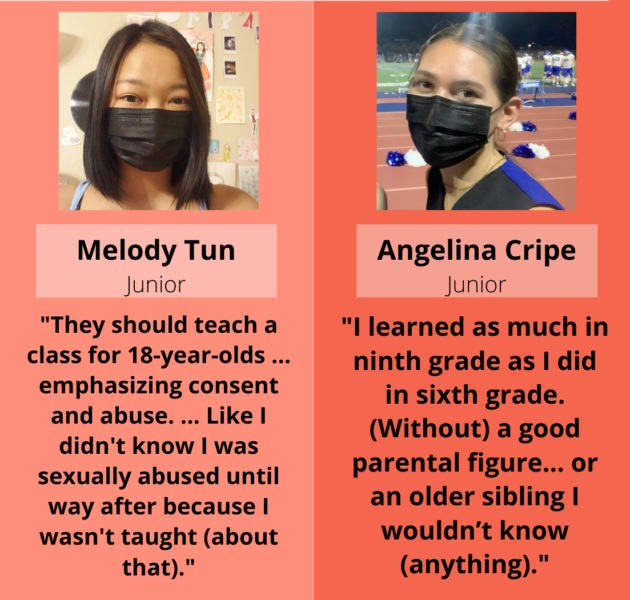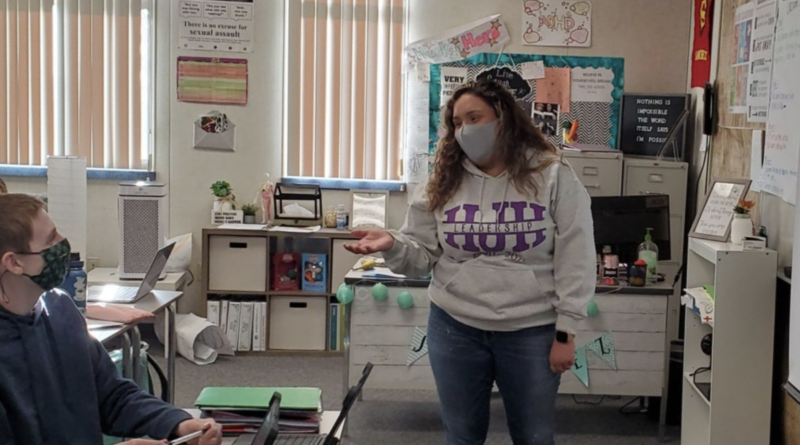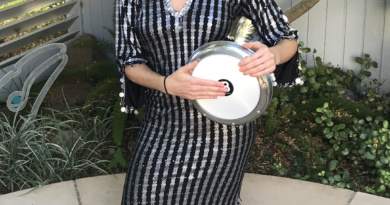Health professionals and teens advocate for updated sex education
PHOTO: Harper Junior High health teacher, Briana Sanchez, teaches her first period class. (Courtesy: Jackie Rivera)
By Stella Maze,
BlueDevilHUB.com Staff–
GENup, a student organization dedicated to giving students a voice in their own education, is working with health teachers to update the sex education curriculum to be more inclusive. Davis High’s GENup club previously helped high school social studies departments in the Davis Joint Unified School District to adopt new and updated textbooks.
GENup students, as well as some staff, believe that, in addition to new curriculum, the district should consider adding a high school sex education refresher course.
DJUSD, like all districts, is required by Assembly Bill 329 to offer a health class once in junior high or middle school and once in high school. DJUSD currently offers health in seventh and ninth grade, but does not offer sex education or health in grades 10 through 12.
Unique challenges in DJUSD
DJUSD’s three year high school system differs from most schools across the country which tend to offer grades 9-12 all at one school.
According to DJUSD’s Director of Secondary Education, Troy Allen, Davis decided to keep health at the junior high campuses in order to make it more convenient for health teachers and to keep them from having to teach on two separate campuses.
However, Allen acknowledges that developmentally it also “makes sense for (sex education to be offered) later (in high school when it’s) relevant,” she said.
The Elk Grove Unified School District and the Sacramento City Unified School District also offer sex education in seventh and ninth grade. However, most schools in Elk Grove and Sacramento are four-year high schools. The Elk Grove district offers health electives that include sex education in both 11th and 12th grade that serve as refreshers for older high school students.
However, the Sacramento City district, like the DJUSD, stops offering sex education and health courses after ninth grade.
While GENup is most focused on actual concrete change within the health curriculum, the group’s president, DHS senior Jason Ma, said that he would like to see a health course offered by DJUSD beyond ninth grade.
“(When you’re in ninth grade) you’re still basically like a middle schooler. You’re not really getting a taste of the real world (yet, so) it’s a bit of a disconnect for students that are unsure how or where they can apply their health class knowledge,” Ma said.
Harper Junior High School health teacher Briana Sanchez agrees that the seventh and ninth grade courses may not be enough on their own for students in their later years of high school.
“I also think there should be a refresher course later on (in high school) for sure,” she said.
When it comes to curriculum, the Davis, Elk Grove and Sac City school districts all have similar priorities: to encourage healthy and respectful relationships and to accurately and comprehensively give all students the information they need to make good decisions for themselves.
Valuable student feedback
According to Matthew Callman and Janna Cantwell, science training specialists in Sacramento, their district uses surveys to gather feedback from students on what they want and need in health classes.
Kelli Quan-Martin, a family life program specialist in Elk Grove, said that Elk Grove’s health courses recently did an audit and found that their current curricula lacked thorough LGBTQ+ inclusivity.
In the future, Quan-Martin said that the Elk Grove district would be working with high school student equity groups to amend this.
Last school year, Davis High’s GENup members initiated a similar, informal audit for DJUSD and sent out surveys asking students for their personal experiences in health classes.
In alignment with Elk Grove’s results, GENup received many complaints about the lack of LGBTQ+ inclusive material within DJUSD sex education.
In response to this feedback, GENup started meeting with DJUSD health teachers like Sanchez to revise the curriculum and make suggestions moving forward.
Sanchez said that students are helpful in updating materials because they have a direct understanding of what students need that goes beyond the experiences and knowledge of most teachers.
LGBTQ+ inclusivity a problem
The problems of LGBTQ+ inclusivity within high school sex education are reflected across the country, said Emily Htway, UC Davis senior and sexual well-being student coordinator for UCD’s Health Education and Promotion department (HEP).
“Currently sex ed is very heteronormative,” Htway said.
According to Htway, there are a number of states in the U.S. that don’t require the teaching of gender and sexuality topics. As a result, many queer students grow up not knowing what they need to in order to make informed decisions for themselves and their bodies.
“(Sex education) needs to be all-encompassing of all of the things that come with being a body that can have sex and have attraction and have all of those identities conglomerating,” Htway said.
“A good model (for sex education) is just to lay it out on the table and (not) withhold things because you think ‘oh I don’t know if they should know that they can do that’ because they’re going to do it.”
Htway, in fact, has personally experienced what it’s like to receive an incomplete sex education. When she was nine years old she had her first health class and it left her utterly baffled and confused.
She recalls that the teachers at her elementary school in southern California separated girls and boys and showed each group a video. The one assigned to the girls consisted of information on fertility and the menstrual cycle. Htway couldn’t begin to imagine what the boys’ group saw.
Afterward, Htway was confused and the adults she went to for clarification didn’t help.
“I remember asking questions about how you get pregnant … and no one could answer that for me,” she said.
It wasn’t until her college reproductive anatomy course when she realized the magnitude of the inaccuracy of the elementary and secondary sex education classes.
Both Htway and Sanchez think that the enemy of a good comprehensive sex education is stigma and the lack of discussion that results from that discomfort.
Learning how to talk about sex
Sanchez said that a lack of communication and understanding can lead to dangerous feelings of shame. Because of this, one of her main goals as a health teacher is “just (to let) students know that it’s okay to talk about (sex and other uncomfortable topics).”
Ma said that in his own ninth grade health class, he didn’t feel that discussion was a big enough part of the class.
“It didn’t feel like there was enough discussion for people to take it completely seriously,” Ma said.
In accordance with this, one of GENup’s most recent suggestions to health teachers had to do with incorporating a unit in health classes that taught students how to talk about extremely sensitive topics such as mental illness and sexual assault. This way, if students have the tools to start the discussion, it is more likely to actually have a discussion.
Through discussion, students and teachers can begin to erase stigma and receive the information they need in order to form strong relationships and live healthily.
Ma predicts that the changes that GENup is currently talking about with health teachers will hopefully show up in the 2022-2023 school year.
Throughout the process, DJUSD health teachers have been eager to learn and listen to the student voice. Ma expressed his gratitude for their open-mindedness throughout the long process but continues to look forward to future change.
“It doesn’t end here. It will be something normal for students to talk to their teachers when they do see issues with the curriculum,” Ma said, “Students are one of the stakeholders in education so they should have a say in education.”
Oct. 21: District promises new sex education on Davis High campus
An email was sent out on Oct. 21 notifying DHS parents that there will be two sessions offering “comprehensive sex education” to juniors and seniors this school year.
The sessions will be optional. The content will be based on the requirements of the California Healthy Youth Act put forth in 2016.
More information about the act and what the sex education sessions will include can be found at https://www.cde.ca.gov/ls/he/se/.
Specific dates, location and method of teaching were not specified in the email. The only additional information included was the opportunity for parents to opt out their child from the sessions.




